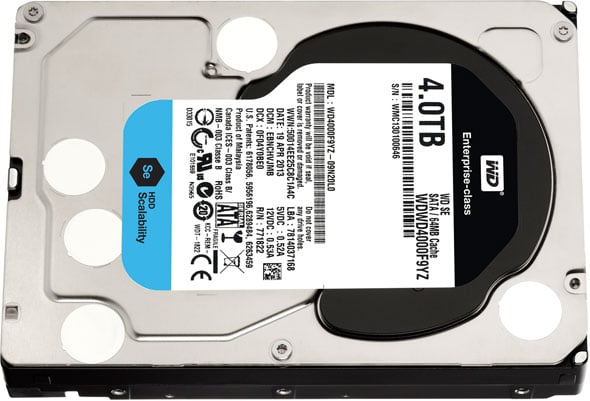Western Digital Launches Enterprise-class "WD Se" HDD Series for Bulk Storage Environments
We all know that solid state storage is the sexy option these days, but a lower cost per gigabyte and higher overall capacities have kept mechanical hard disk drives (HDDs) from becoming irrelevant or otherwise obsolete, especially in datacenter environments. It's no surprise, then, that Western Digital continues to devote time and resources into HDDs. The company's newest product is its WD Se family, a line of enterprise-class HDDs that are best suited for bulk cloud storage, small-to-medium business (SMB) environments, high-end NAS applications, replicated environments, archiving, and other backup-heavy scenarios.
These 3.5-inch drives ship in 2TB, 3TB, and 4TB capacities, each one with a 7,200 RPM spindle speed, 64MB cache, SATA 6Gbps interface, and utilizing Advanced Format 4K sector technology. The drives are built for the rigors of 24x7x365 operation and backed by 5-year warranties. Each one has a multi-axis shock sensor, a motor shaft that's secured at both ends to reduce system-induced vibration and to stabilize platters (WD dubs this StableTrac), dynamic fly height technology (read-write head's fly height is adjusted in real-time for optimum reliability), dual-actuator technology, and a few other features. On top of it all, every single drive is put through extended burn-in testing with thermal cycling to ensure reliable operation, Western Digital says.

These 3.5-inch drives ship in 2TB, 3TB, and 4TB capacities, each one with a 7,200 RPM spindle speed, 64MB cache, SATA 6Gbps interface, and utilizing Advanced Format 4K sector technology. The drives are built for the rigors of 24x7x365 operation and backed by 5-year warranties. Each one has a multi-axis shock sensor, a motor shaft that's secured at both ends to reduce system-induced vibration and to stabilize platters (WD dubs this StableTrac), dynamic fly height technology (read-write head's fly height is adjusted in real-time for optimum reliability), dual-actuator technology, and a few other features. On top of it all, every single drive is put through extended burn-in testing with thermal cycling to ensure reliable operation, Western Digital says.

Western Digital is positioning the Se series between the WD Red and WD Re lines, essentially billing it as a mid-range solution for medium workloads. It's intended for scale-out architectures so that customers can grow and "scale massively" while striking a balance between cost, capacity, performance, and reliability. It's a more reliable drive than your typical desktop HDD, for example, but not as performance oriented (or as expensive) as the WD Re line, though the company has yet to announce MSRPs and a release date.
We expect to see more drive makers concentrate on serving cloud providers and bulk storage environments. Citing a Digital Universe study, Western Digital says the total amount of data generated in the year 2020 is expected to be around 40,000 exabytes. It's a mind-boggling number, though hardly surprising with the proliferation of mobile and technological advancements that have led to consumers being able to record HD video and shoot high-resolution photos from their phones and other mobile devices.
We expect to see more drive makers concentrate on serving cloud providers and bulk storage environments. Citing a Digital Universe study, Western Digital says the total amount of data generated in the year 2020 is expected to be around 40,000 exabytes. It's a mind-boggling number, though hardly surprising with the proliferation of mobile and technological advancements that have led to consumers being able to record HD video and shoot high-resolution photos from their phones and other mobile devices.

